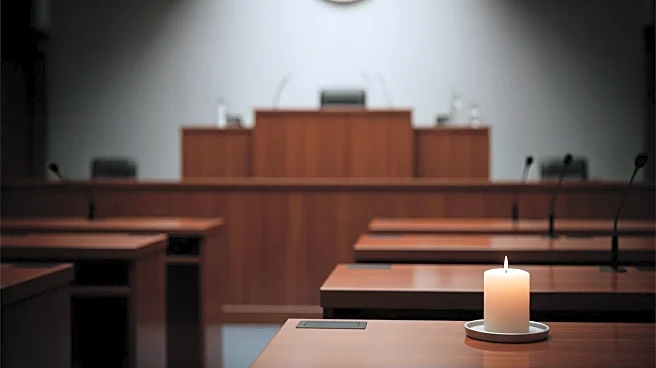What's Happening?
A community rally has emerged at a Lincoln Square school in Chicago following the detention of Brayan Plata, a parent of a special needs child, by federal immigration agents. Plata, who was working a landscaping
job in Skokie, was taken into custody, leaving his family, including a newborn, a five-year-old autistic preschooler, and an older daughter, in distress. Plata and his wife, Ingrid Guanume, are Colombian asylum seekers who arrived in Chicago in 2018. Guanume expressed the family's reliance on Plata, who holds a license and work permit, as the primary caregiver and breadwinner. The incident has unsettled the family and prompted support from the school community.
Why It's Important?
The detention of Brayan Plata highlights ongoing tensions surrounding immigration enforcement in the U.S., particularly affecting families with special needs children. This incident underscores the challenges faced by immigrant families seeking asylum and the impact of immigration policies on community stability. The rally at Lincoln Square school reflects broader societal concerns about the treatment of immigrants and the need for supportive measures for families in similar situations. The event may influence public discourse on immigration policy and the rights of asylum seekers, potentially affecting future legislative actions.
What's Next?
The community's response to Plata's detention may lead to increased advocacy for immigrant rights and asylum seekers in Chicago and beyond. Legal proceedings regarding Plata's detention are expected to unfold, with potential involvement from immigration rights groups and local officials. The school community's rally could prompt further discussions on the role of educational institutions in supporting affected families. Additionally, there may be calls for policy reforms to address the needs of immigrant families with special needs children.
Beyond the Headlines
This incident raises ethical questions about the balance between immigration enforcement and humanitarian considerations, particularly for families with vulnerable members. It may also lead to discussions on the legal protections available to asylum seekers and the adequacy of current immigration policies. The community's rally could serve as a catalyst for broader movements advocating for immigrant rights and policy changes at local and national levels.








